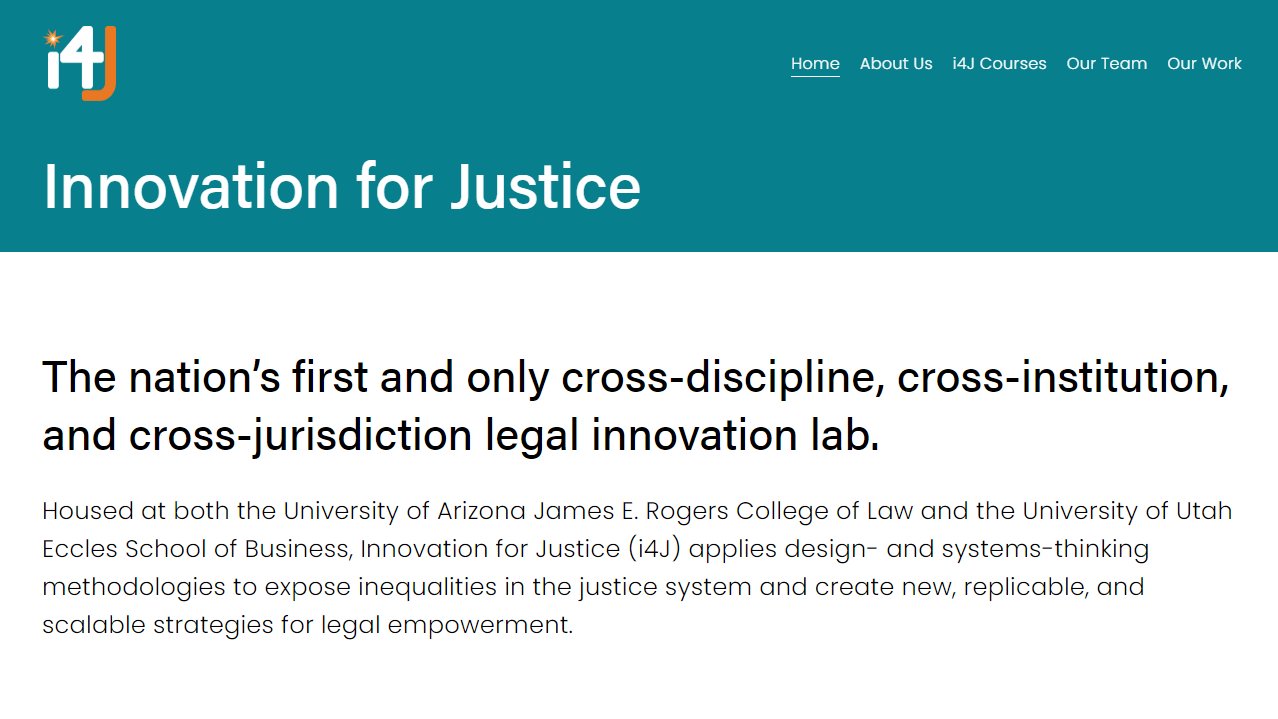Innovation for Justice, a legal innovation lab focused on social justice, launched at the University of Arizona James E. Rogers College of Law in 2018, has expanded its operations to form a collaboration with the University of Utah David Eccles School of Business, making it the first cross-discipline, cross-institution, cross-jurisdiction legal innovation lab in the United States.
The collaboration means that graduate-level students from both the University of Utah and the University of Arizona, including law students, will be able to enroll in courses offered by I4J — as the program is called in shorthand.
Three courses will be offered this fall, all conducted virtually, that combine teaching with projects intended to address social justice issues. Each course will be open to 16 students. This year’s courses will focus on three projects:
- Innovation for Justice, in which students will design new initiatives at the intersection of regulatory reform and housing instability, with a focus on developing a program for non-lawyer advocates to help in housing matters.
- Innovating Legal Services, in which students will create a Medical Debt Policy Scorecard that inventories the medical debt policies in all 50 states and ranks states based on existing consumer protections.
- UX4Justice, in which students will evaluate and redesign the user experience of the Utah State Courts’ online self-help materials for defendants in debt collection.
Past I4J projects have included developing and launching a new tier of civil legal professional in Arizona, developing a free tool for helping tenants and landlords communicate, developing a toolkit for advocates of human trafficking survivors, and creating an ambitious tenant-education program to reduce evictions.
More recently, two programs developed by I4J to assist individuals with medical debt became among the first programs approved to participate in Utah’s regulatory sandbox.
I4J also worked with the Utah State Courts to conduct usability testing of its online dispute resolution system for debt collection cases.
Teaching Business Skills ‘A No-Brainer’
Stacy Butler, I4J’s executive director, told me that, through these connections to Utah, as well as I4J’s engagement in regulatory reform initiatives in both states, the University of Utah had developed an interest in working with I4J more closely.
Related: LawNext Episode 60: Stacy Butler on Innovation for Justice.
She is particularly excited, she said, by the cross-disciplinary collaboration between the law school and the business school.
“We’re talking about changing service delivery models,” Butler said. “To me, it’s a no-brainer that we would want to have business skills involved in that work.”
She also sees that as an important component of legal education.
“If we want to train lawyers who know how to work with other disciplines, and we’re creating a world in which lawyers can share ownership of their practices with other disciplines, I think they should be meeting those other disciplines when they’re in training and building those relationships as part of their education.”
Insofar as this collaboration makes I4J the first cross-discipline, cross-institution, cross-jurisdiction legal innovation lab in the U.S., I asked Butler why she thinks that is significant. She said that each is significant in its own way.
The fact that the program crosses jurisdictions is important because differences among jurisdictions have posed a major obstacle to scaling legal innovations. If programs are able to tackle legal problems in a way that is “jurisdiction agnostic,” then those solutions will be better able to scale.
As for crossing disciplines, that is necessary to break lawyers’ monopoly over the delivery of legal services. “The legal profession has declared a monopoly for services it’s not providing. If we’re going to change that, we need to stop putting only lawyers at the table to discuss what to do differently.”
Crossing institutions is important, Butler said. because “it’s a call to legal education to stop siloing yourselves and work together to drive change. I think we can go further faster if we, as law schools, start working together with others.”
I4J’s Arizona-Utah partnership is being launched as a three-year pilot made possible by a contribution by a contribution by two University of Utah alumni, entrepreneur Michael Caldwell-Waller and lawyer Burgundy Caldwell-Waller.
 Robert Ambrogi Blog
Robert Ambrogi Blog
